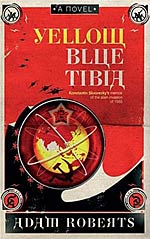
![]() Triseult
Triseult
9/14/2012
![]()
Yellow Blue Tibia is a strange, delightful beast. At times it can be a farce, a satire of Soviet-era Russia, a reflection of the role of SF in society, a thought experiment on the cultural phenomenon of UFO sightings, and a conspiracy novel. The tale truly shines when it combines all of these elements at once.
Roberts' tale manages something truly rare in SF: it instills a sense of skepticism in the reader, which lasts throughout the book. It's never truly clear if we're reading a SF tale, or the story of people deluded into believing in aliens. The mystery at the heart of the book kept me engaged at every page, even when I felt the action slowed down or meandered. The unpredictability of the story is truly refreshing in a world of worn-out tropes and predictable tales.
Another strong aspect of Yellow Blue Tibia is the dialogs. Roberts has an ear for character arguments and misunderstandings. To read Roberts' characters talk is to witness just how tragic and funny it can be when two characters utterly fail to get their point across to the other. The dialogs go on and on, but they're hilarious and unpredictable, and never boring. Some key scenes in the novel reach utter brilliance for their perfect blend of humor, witty dialogs, and dramatic tension. The car chase, as well as the ending itself, are two perfect moments in the novel where Roberts transcends all the genres he tries to blend.
There are a few points on which Yellow Blue Tibia fails to achieve true greatness. The most important one is its story and pacing: although the set pieces and the dialogs keep the reader fully engaged, the overall plot meanders around and moves at a haphazard, sometimes frustrating pace. Character motivations are unclear, and the protagonist basically gets pushed around by the requirements of the plot. Likewise, although some characters are funny and complex, others are mere sketches or caricatures. The biggest offender is Dora, whose only characteristic of note is that she's fat and American. As hard as I try, I can't find anything else to say about her, and yet she's one of the most important characters in the story.
An important criticism of Yellow Blue Tibia, leveled notably by Catherynne M. Valente on her Livejournal, concerns the setting's verisimilitude. Valente argues that Roberts has utterly failed to capture the culture and mindset of Soviet-era Russia, to the point that she despised everything about the novel. Verisimilitude of foreign settings is usually of huge importance to me; I found similar problems with The Windup Girl's Thai setting, for instance, so I understand where Valente is coming from. But being totally ignorant of Soviet-era culture, I have to give this novel a pass on the matter. Furthermore, I believe that the novel's satirical nature makes its anachronisms and cultural faux-pas more forgivable. It's clear, for instance, that Roberts was not trying too hard for historical accuracy when he gave one of his characters Asperger syndrome. This leads me to believe that Ms. Valente largely missed the point of Roberts' novel. And unless you're familiar with Russian culture, I doubt you'll have a problem with the novel's verisimilitude yourself.
Yellow Blue Tibia has its flaws, but overall it stands as a truly unique piece of SF literature that keeps you guessing until the end. It's part Foucault's Pendulum, part SF nostalgia, and when it gets into high gear, it's one hell of a hilarious adventure.